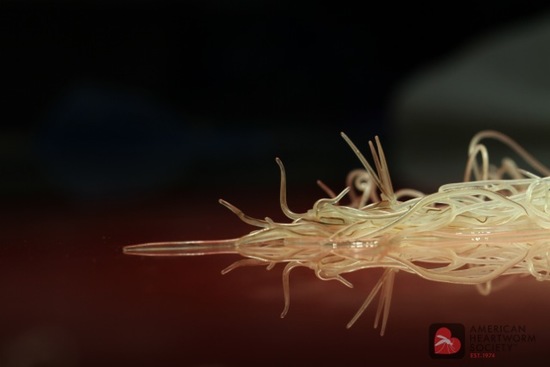The dangers of heartworm disease: how cat and dog owners can keep their pets safe
Thursday, April 3, 2025
With spring heating things up, it’s a good time for a reminder: heartworm disease is a threat to your cat or dog all year round.
Heartworms are a parasite that infect animals after being transmitted by mosquitos. A mosquito bites an infected animal, taking in a blood meal, which will contain tiny heartworms. The worms develop into a larval stage over a period of days, and when the mosquito bites another healthy animal for a meal, the larva enter through the bite. From there they develop over several months into adult heartworms that enter the pulmonary system and the heart. These parasites have been found in all 50 states, so colder weather does not mean heartworms aren’t present.
Heartworms can reach up to a foot long, and the adults can live in a dog’s body for 5-7 years.
Dogs are considered a natural host for heartworms, meaning their body composition is most suited for the heartworm’s development. However many other mammals can contract heartworm, including cats.
The best way you can prevent heartworm disease in your pet is to “Think 12!” That means, your pet should be covered by a heartworm preventative 12 months a year, and once every 12 months, your pet should be tested to confirm they are heartworm negative.
 There are various methods of preventatives out there. It’s important to speak to your vet about heartworm prevention options to be sure your pet is following a safe and effective prevention plan.
There are various methods of preventatives out there. It’s important to speak to your vet about heartworm prevention options to be sure your pet is following a safe and effective prevention plan.
If a dog develops heartworm disease, symptoms can include some coughing, lethargy, or exercise intolerance. The early symptoms may not seem severe, but as the parasites grow they can ultimately cause heart failure and become fatal. So, again, prevention is key!
Unfortunately, lack of prevention means heartworm disease is common in Florida. If caught early enough, dogs can receive treatment for this parasitical disease, but it is expensive and spans over several months. The damage caused by having parasites in their heart, lungs, and associated vessels is long-lasting. Many shelters will euthanize dogs who test positive for heartworm disease due to those reasons; as long as a dog still has a good quality of life, we will begin heartworm treatment and continue the treatment to completion for a dog in our care, even after he or she has been adopted.
Cats are also affected by heartworm, although it’s less common because their bodies don’t present the same “natural host” conditions as dogs. Cats may develop fewer worms, but once a heartworm reaches an immature or adult stage in a cat, there is no treatment available. So prevention for your cat is just as important – even if they live inside.
We all know that Florida is a mosquito’s paradise. Whether you are a full-time Florida resident or a snowbird to a cooler northern climate, however, ensuring your cat or dog is on heartworm prevention all year round is crucial to their life-long wellness!

